Key takeaways:
- Identify specific packaging needs, considering factors such as size, durability, and environmental impact to ensure alignment with values and requirements.
- Research options thoroughly; utilize customer reviews and direct supplier communication to uncover hidden features and critical insights about packaging performance.
- Make informed packaging decisions by weighing costs against benefits, including quality, customer experience, and brand perception, rather than just focusing on sticker prices.
- Create a checklist of must-have features and visualize packaging in action to guide the selection process, ensuring choices resonate with both brand identity and customer satisfaction.
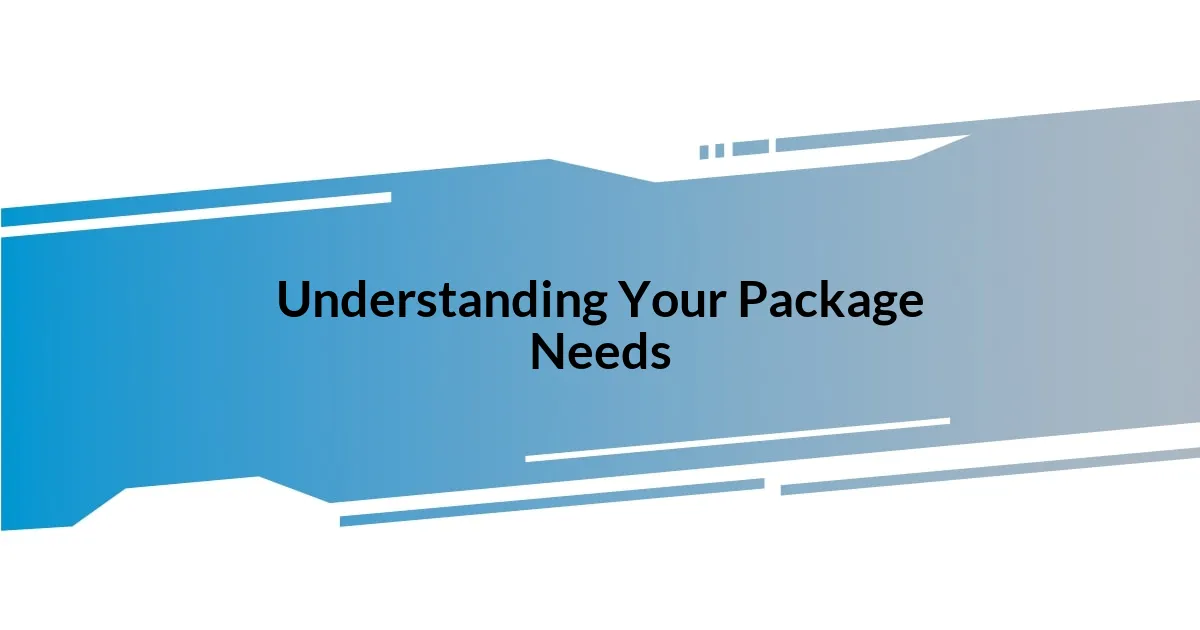
Understanding Your Package Needs
When I first started exploring package options, I was overwhelmed by the sheer number of choices available. It made me wonder: What exactly do I need? I learned that pinpointing your specific requirements—like size, durability, and intended use—can transform that chaos into clarity.
I remember a time when I chose a flimsy package for a fragile item. The result? A shattered mess that cost me both money and time. That experience drove home the importance of understanding not just what I wanted, but what my items truly needed. Are you taking the same care in evaluating the fragility of your goods?
As you delve into your package needs, consider factors like shipping methods, storage conditions, and even customer engagement. I once switched to eco-friendly materials for my packages, and it not only reduced waste but also resonated with my customers. What adjustments are you willing to make to ensure that your package is not just protective but also aligned with your values?
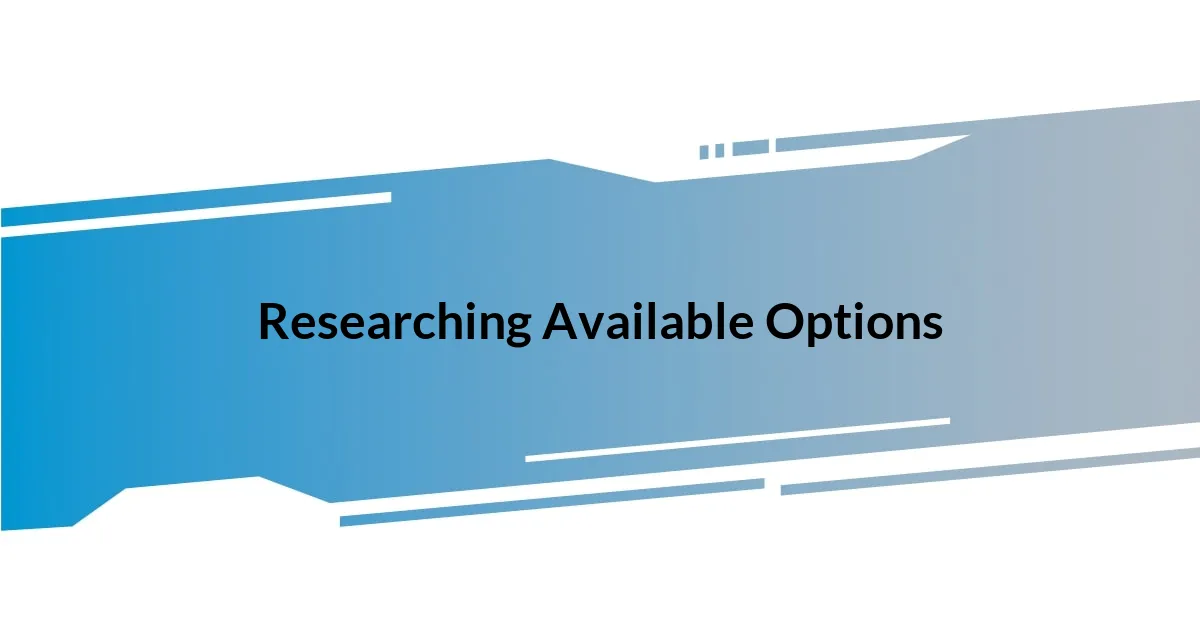
Researching Available Options
When researching available options, I found it essential to cast a wide net. Initially, I started by listing out all possible suppliers and materials online, comparing their strengths and weaknesses. One day, while browsing a reputed packaging site, I stumbled upon customer reviews that revealed a common issue with moisture resistance. It was eye-opening to learn how vital this factor is, especially since I often ship products to humid climates.
In another instance, I made a call to a supplier to clarify their return policy on bulk orders. The conversation was surprisingly revealing. I learned that some packages could be customized at no additional charge, which completely changed my approach. Discovering this flexibility made me realize that hidden gem features often lie behind direct communication, something not always evident in online descriptions.
As I narrowed down my options, I created a visual comparison chart to assess key factors like price, durability, and availability. This approach not only streamlined my decision-making process but also highlighted where I might compromise. It was a simple, yet effective, step that I now recommend to anyone embarking on a similar journey.
| Supplier | Price ($) | Durability | Customizable |
|---|---|---|---|
| Supplier A | 50 | High | Yes |
| Supplier B | 30 | Medium | No |
| Supplier C | 40 | High | Yes |
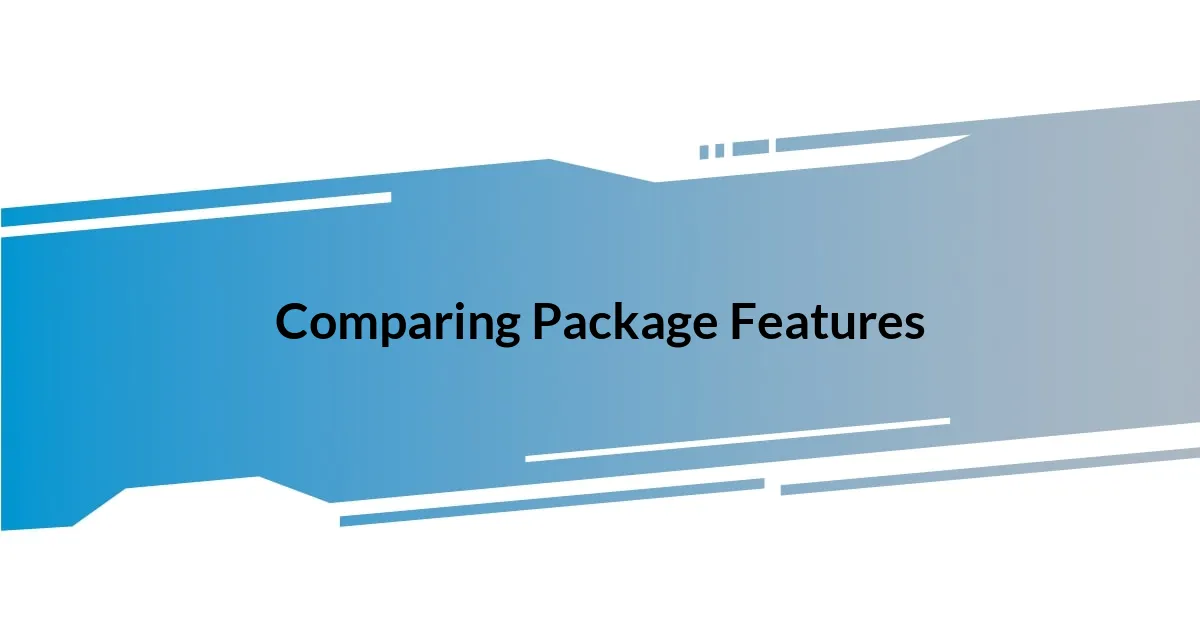
Comparing Package Features
When I started comparing package features, I quickly realized it meant more than just looking at price tags. Some packages boasted impressive durability, while others had unique designs that caught my eye. For instance, I once chose a biodegradable option for a seasonal promotion, and my customers appreciated the sustainable choice. That small decision had a ripple effect, enhancing my brand image while also meeting environmental values. Here’s what I learned to compare:
- Material Quality: Is it strong enough for your items?
- Size Options: Are there various dimensions to fit your needs?
- Customization: Can it be designed to reflect your brand?
- Cost-Effectiveness: Is it worth the investment in the long run?
- Resilience to Elements: Is it water-resistant or suitable for different climates?
Diving deeper into features can be a game-changer. I vividly remember a situation where I overlooked the weight of the package. It turned out heavier materials significantly increased shipping costs. After that realization, I started weighing the implications of each packaging choice. Little details like tab closures versus adhesive flaps can influence ease of opening, impacting customer satisfaction. Here’s a quick checklist for evaluating package features:
- Openness Experience: How easy is it for customers to access the contents?
- Visual Appeal: Does the design attract attention?
- Transport Efficiency: Will it withstand the rigors of shipping?
- Storage Needs: Can it be efficiently stored before use?
- Regulatory Compliance: Does it meet industry standards?
Taking the time to compare these features not only helped optimize my packaging strategy but also gave me a confidence boost that I was making informed decisions.
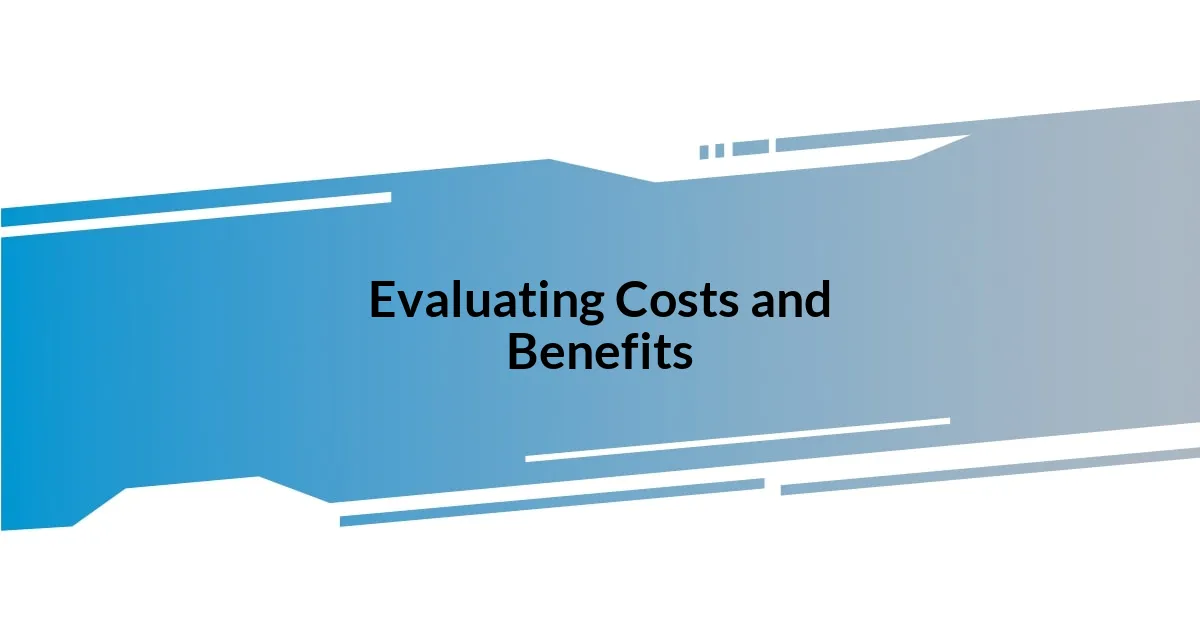
Evaluating Costs and Benefits
Evaluating costs and benefits in packaging can feel like a daunting task, but I’ve learned to simplify it through a thoughtful approach. For me, it often starts with the obvious—does the price make sense for my budget? However, I’ve found that the sticker price is just one layer of the equation. I remember a time I hesitated to invest a little more for a higher-quality material because of a tight budget. In retrospect, that slightly pricier option saved me money in the long run by reducing returns and ensuring my products arrived intact.
As I dove deeper into my evaluations, I began to appreciate the hidden costs that might not be immediately apparent. When I opted for a low-cost supplier, I became frustrated by the delays and poor customer service, which created ripple effects on my timeline. This experience led me to ask questions like, “How does the price affect my overall satisfaction?” Understanding the balance between cost and service can be just as critical as the monetary value.
Ultimately, I realized that every packaging choice impacts not just my bottom line, but also customer experience and brand perception. Think about it: investing in quality packaging isn’t merely a transaction; it’s a way to communicate respect for your customers and your product. I vividly remember receiving a beautifully presented package myself, prompting me to re-evaluate my priorities in packaging selection. This journey taught me that investing wisely can build loyalty, turning one-time buyers into repeat customers.
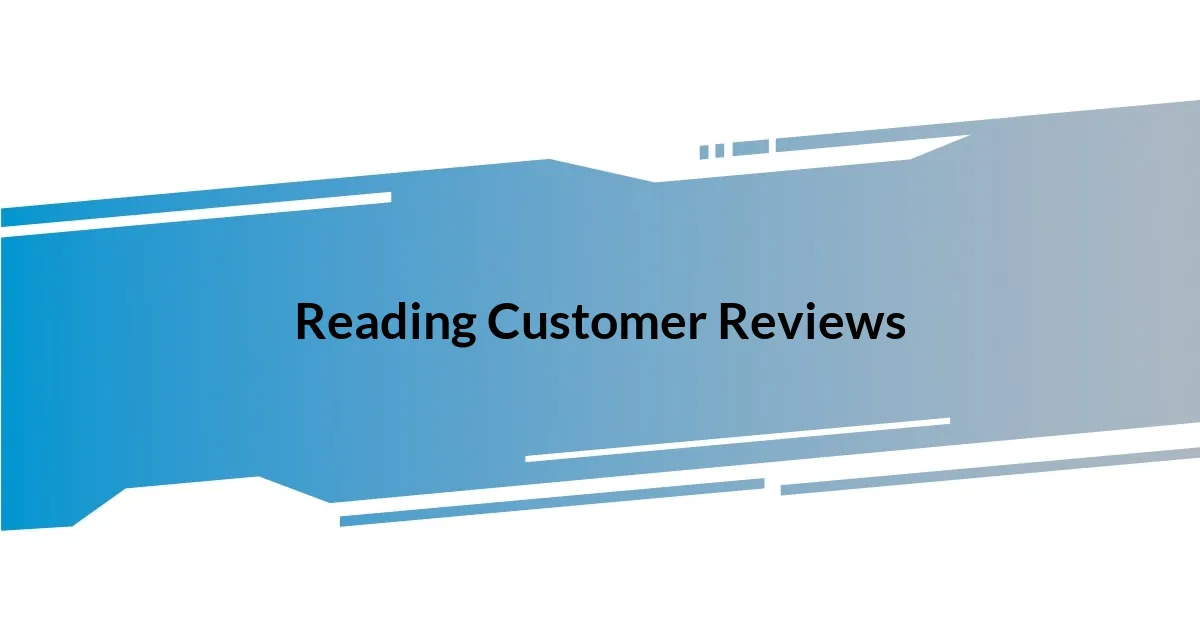
Reading Customer Reviews
Reading customer reviews has been one of the most enlightening parts of my journey to find the best packaging options. I used to glance over them, thinking they were just opinions. Then, I remember stumbling upon a review that spoke candidly about how the packaging had arrived damaged. That review resonated with me, as it highlighted a crucial aspect I hadn’t considered: the packaging’s reliability during transit, something I was about to overlook entirely.
One instance really struck me. A customer excitedly shared how the thoughtful packaging enhanced their unboxing experience. They mentioned the delightful surprise of finding a handwritten thank-you note tucked inside. I found myself asking, “How can I replicate that emotional connection?” This reflection made me realize that packaging is about more than just protection; it’s an opportunity to engage and delight customers, paving the way for their loyalty and appreciation.
As I continued my research, I noticed a pattern in the reviews that emphasized transparency about materials used. Many customers prefer environmentally friendly options, and I found myself nodding in agreement. It simply confirmed my inclination towards sustainable choices. I can’t help but wonder how many of us overlook that these opinions can be a compass, guiding us to make better and more informed choices. Each review is a piece of advice I wish I had visited sooner on my packaging journey!
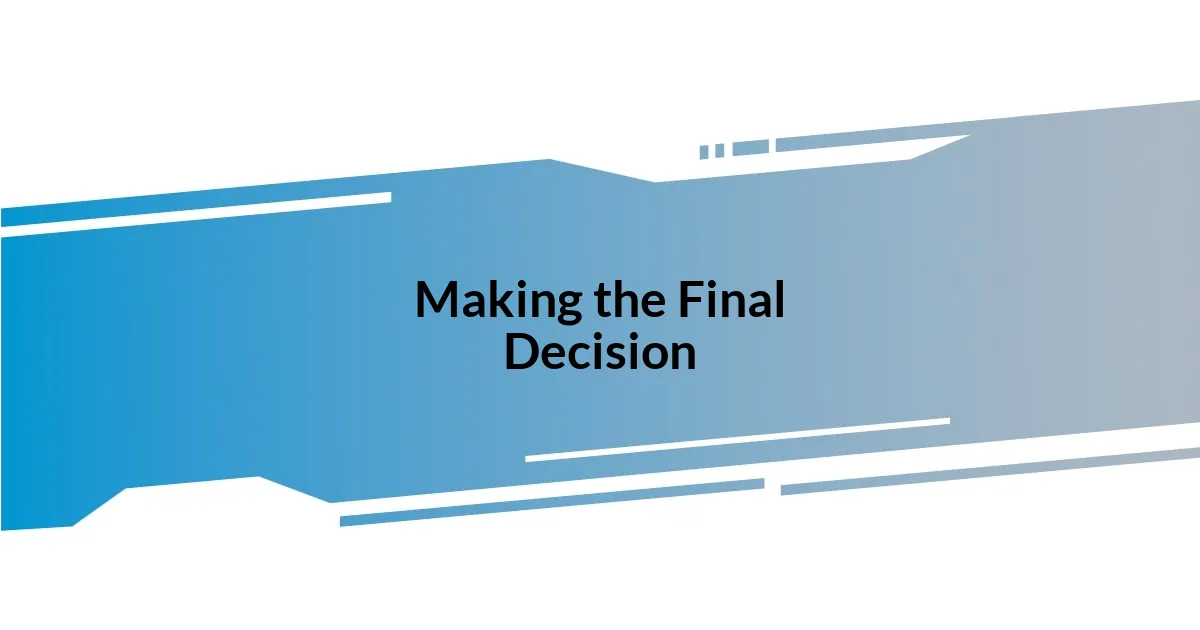
Making the Final Decision
Making the final decision in my packaging journey was both exciting and nerve-wracking. I vividly remember standing in my kitchen, surrounded by samples, feeling the texture of each option. The question tugging at me was, “Which one truly aligns with my brand ethos and my customers’ expectations?” It felt like a crossroads—choosing between practicality and the emotional connection I wanted to foster.
As I sifted through my choices, I called upon past experiences. I recalled a friend’s laughter when they received a beautifully wrapped gift from me; the joy on their face and how the presentation mattered. It dawned on me that my packaging could evoke similar responses. Was I ready to invest in that kind of emotional impact? I learned that the final decision isn’t just about meeting requirements—it’s also about creating a bond with my customers.
Ultimately, I took a deep breath and followed my gut. I chose a package that was not only functional but also aesthetically pleasing and aligned with my commitment to sustainability. Reflecting on that moment, I felt a wave of relief wash over me—the feeling of having listened not just to logic, but to my heart as well. Would I have made the same choice if I hadn’t allowed my emotions to guide me? This experience reinforced my belief that the final decision should balance practical needs and the emotional narrative I want my packaging to convey.
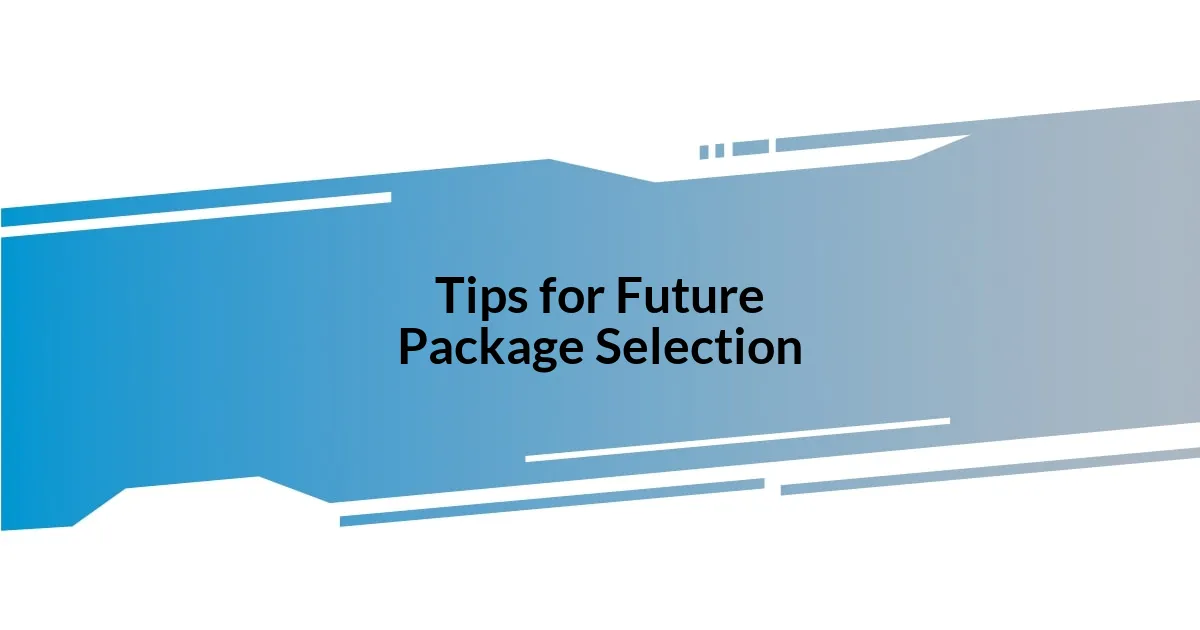
Tips for Future Package Selection
I’ve learned that it’s absolutely essential to create a checklist of must-have features before diving into package selection. For instance, once I realized that my products needed to be secure yet visually appealing, I prioritized both durability and design. Reflecting on where I went wrong in the past, I now ask myself, “Am I focusing on what truly matters to my business and my customers?” This question has guided my process and prevented unnecessary detours.
A key tip that has transformed my approach is to never rush through the selection phase. I remember a time when I hastily settled on a package that looked good but ultimately lacked protective qualities. It was disheartening to learn that a customer received a damaged item due to my oversight. Now, I often take days—or even weeks—to explore options thoroughly, weighing the pros and cons. This patience has led me to options that resonate more deeply with my brand story.
Don’t underestimate the power of visualizing your package in action. I vividly recall picturing my products nestled in their packaging, imagining the delight of customers as they unbox them. I would encourage you to think about how your packaging will look in real-world scenarios. The more tangible my vision became, the clearer my choice reflected my brand personality and values. It’s this kind of imaginative engagement that drives forward-thinking decisions and makes the entire journey worthwhile!